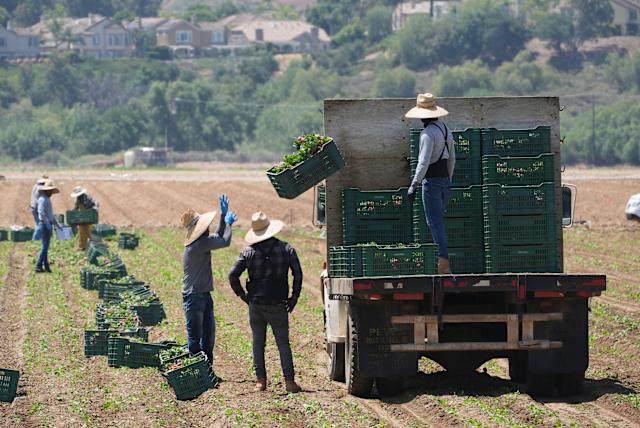President Trump has abruptly ordered a pause on most workplace ICE raids, giving a surprising break to several major U.S. industries—from farms to hotels—that had been bracing for mass labor disruptions.

With immigration enforcement on pause in nonviolent sectors like agriculture, hospitality, and restaurants, some of the nation’s most labor-dependent businesses just caught a major break. But whether this is a long-term shift or just a strategic pause remains to be seen.
Trump Halts ICE Raids
| Industry | Immediate Impact |
|---|---|
| Agriculture | ICE workplace raids paused, easing fears of harvest loss |
| Hospitality | Tourism hubs retain critical staff |
| Restaurants | Worker stability improves |
A Sudden Pivot Amid Economic Fallout
After weeks of escalating immigration enforcement, Trump shocked both critics and supporters by freezing most workplace raids conducted by U.S. Immigration and Customs Enforcement (ICE).
According to the New York Times, the administration is halting raids in industries like farming, hospitality, and food service unless criminal activity is involved. That means no more mass arrests of undocumented workers at fields, kitchens, or hotel backrooms—at least for now.
“This is not a reversal on illegal immigration,” one senior DHS official told Axios. “It’s about practicality. We can’t gut whole industries overnight.”
Who Benefits Most?
Agriculture & Meatpacking
About 40% of U.S. farmworkers and up to 90% of meat-processing staff are undocumented. These sectors faced chaos as ICE arrests spiked to 1,300 per day in June.
Farmers in California and Georgia reported rotting produce and labor shortages as raids disrupted operations. In places like Ventura County, known for strawberries and citrus, the relief couldn’t come fast enough.
Hospitality & Tourism
Hotels, especially in California and Florida, rely heavily on undocumented labor for housekeeping, landscaping, and kitchen roles. With summer travel in full swing, Trump’s order is expected to prevent massive staffing gaps. One large hotel operator in Anaheim said morale had already improved:
Restaurants & Food Service
From food trucks to fine dining, restaurants have struggled with worker absences and customer drop-offs due to fear. The sudden policy shift allows business owners to stabilize staffing without the looming threat of raids.
Daily Beast reports that DHS will still target traffickers and repeat criminal offenders, but casual laborers won’t be rounded up.
Construction
While not directly named, construction is another industry feeling the ripple effect. Many undocumented workers shift between seasonal agriculture and construction gigs. A halt in raids means projects—from housing to highways—can avoid sudden worker shortages.
The Associated Builders and Contractors group said the pause “reduces immediate risk of project shutdowns.”

What Triggered the Change?
- Nationwide protests: Over 1,800 U.S. cities saw mass demonstrations, with the “No Kings” campaign calling the raids authoritarian.
- National Guard & military pushback: Trump’s deployment of Marines in Los Angeles was met with legal and logistical backlash.
- Business pressure: Industry groups lobbied the administration to protect critical labor pipelines.
What Happens Next?
The halt is not permanent. ICE can still conduct raids tied to violent crimes, trafficking, or repeat offenses. But for now, most enforcement in workplaces is paused.
As someone who’s covered both immigration reform and labor economics, I’ve seen how vulnerable our food and hospitality systems are to worker disruptions. One strawberry farm I visited in 2021 lost nearly half its harvest due to a single ICE sweep. This pause isn’t just political—it’s economic triage.
FAQs
What industries are currently protected from ICE raids?
Farms, restaurants, hotels, and similar service sectors are exempt from most raids unless criminal activity is suspected.
Can ICE still arrest people in these sectors?
Yes—if there’s evidence of smuggling, human trafficking, or violent crime. But ordinary workplace sweeps are paused.
Is this a permanent change?
No. The order is temporary and may change based on political or public pressure.






